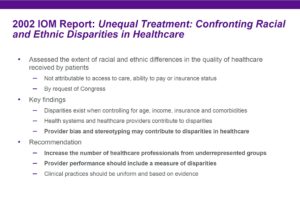
Addressing explicit and implicit biases is an important part of improving patient care and health equity, according to a presentation by Ugo Iroku, MD, MHS, assistant professor at the Icahn School of Medicine at Mount Sinai, who spoke on the topic at Digestive Disease Week® (DDW) 2022.
DDW News spoke with Dr. Iroku about how biases show up in gastroenterology and hepatology and what physicians can do to address them.
DDW: What are the differences between explicit and implicit biases?
Iroku: Biases are stereotypes and attitudes that we hold towards others typically based on characteristics such as race, gender, age, socioeconomic status, religion or sexual orientation. Explicit bias is when we are aware of our biases. Implicit biases are deeply held beliefs that affect our cognition and actions without us even being aware of it. You can have implicit bias in a way that you would not consciously endorse. It can be that subtle.
DDW: What are some examples of implicit and explicit bias?
Iroku: Examples of explicit bias include when a provider may believe statements such as “women typically complain about non-life-threatening pain more than men,” or “Black patients are not as likely to follow through with treatment recommendations.” These are stereotypes that a person consciously considers and believes to be true.
An example of implicit bias is when physicians who do not personally espouse the fact that race should matter with regard to medical care are nonetheless less likely to give emergent stroke treatment to Black patients than to white patients.
 DDW: Are there any studies or data that demonstrate the existence or impact of patient bias in gastroenterology/hepatology?
DDW: Are there any studies or data that demonstrate the existence or impact of patient bias in gastroenterology/hepatology?
Iroku: There are many! A study at the University of Chicago published last year demonstrated that with the same clinical data, Black and white patients were treated very differently during their medical workup. In this case, Black people displaying signs and symptoms that warranted evaluation for celiac disease and/or inflammatory bowel disease were 91% less likely to receive it than their white counterparts.
DDW: How do these biases impact patient care and management?
Iroku: Ultimately, these biases can form the components of social determinants of health — the social issues that have a downstream effect on health outcomes. As the 2002 Institute of Medicine report demonstrated, even in places where access to health services is comparable between races, health treatment is not.
DDW: How do you recommend gastroenterologists/hepatologists reduce their personal biases?
Iroku: There are three key factors that can reduce biases among physicians: awareness, diversity and communication.
- Awareness of biases is a first step. Consider taking the Implicit Association Test for insight into the insidious nature of implicit bias. The Project Implicit website is a good resource towards that end.
- Diversity in the workplace can offer counter-stereotypical exemplars and can challenge unchecked biases. Engaging with individuals from a certain demographic who break certain stereotypes can be helpful in highlighting and avoiding biased actions.
- Communicate and seek feedback. A physician’s stereotypes towards patients may extend to staff and colleagues. Create a work environment where feedback is welcome whenever biases are consciously or unconsciously expressed in the workplace.
Dr. Iroku will give the oral presentation, “Reducing implicit and explicit patient bias” on Sunday, May 22, at 2:12 p.m. PDT as part of the session “Time to Act: Improving Diversity, Equity, and Inclusion in Gastroenterology and Hepatology.”



